名词性从句、定语从句和状语从句1
- 格式:doc
- 大小:42.50 KB
- 文档页数:4
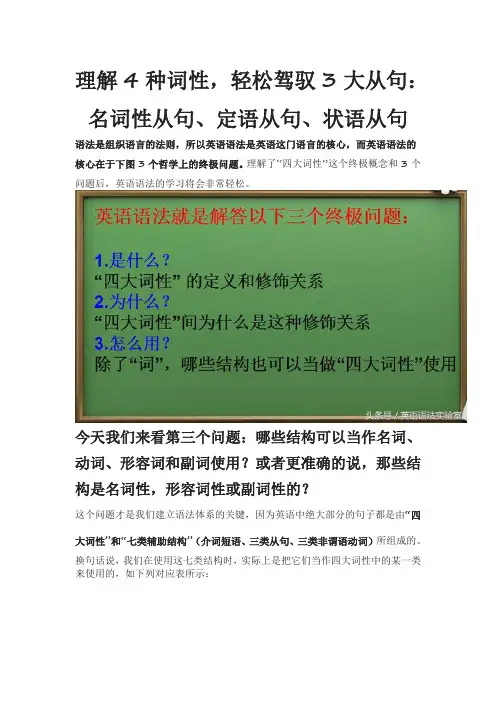
理解4种词性,轻松驾驭3大从句:名词性从句、定语从句、状语从句语法是组织语言的法则,所以英语语法是英语这门语言的核心,而英语语法的核心在于下图3个哲学上的终极问题。
理解了“四大词性”这个终极概念和3个问题后,英语语法的学习将会非常轻松。
今天我们来看第三个问题:哪些结构可以当作名词、动词、形容词和副词使用?或者更准确的说,那些结构是名词性,形容词性或副词性的?这个问题才是我们建立语法体系的关键,因为英语中绝大部分的句子都是由“四大词性”和“七类辅助结构”(介词短语、三类从句、三类非谓语动词)所组成的。
换句话说,我们在使用这七类结构时,实际上是把它们当作四大词性中的某一类来使用的,如下列对应表所示:注:只有谓语动词才具有动词词性,其他任何结构包括非谓语动词都无法替代。
所以不再列出。
从上表可以看出,从句分为名词从句、定语从句、状语从句三个大类,正好分别对应了名词、形容词、副词这三大词性。
所以,我们也可以这样理解这三类从句:1.名词性从句:可以当作名词使用的从句。
顾名思义,就是把一个完整的句子当做名词来用,在另一个句子(主句)中充当成分,而名词常做四种成分:主语,宾语,表语,同位语。
所以便有了四种名词性从句:主语从句,宾语从句,表语从句和同位语从句。
例句回顾:①That English is important is known to all.(主语从句)注:避免头重脚轻It is known to all that English is important. (It作形式主语)② We all know that English is important.(宾语从句)③ What we all know is that English is important.(表语从句)④ What is known to all is the fact that English is important.(同位语从句)2.定语从句:可以当作形容词使用的从句。
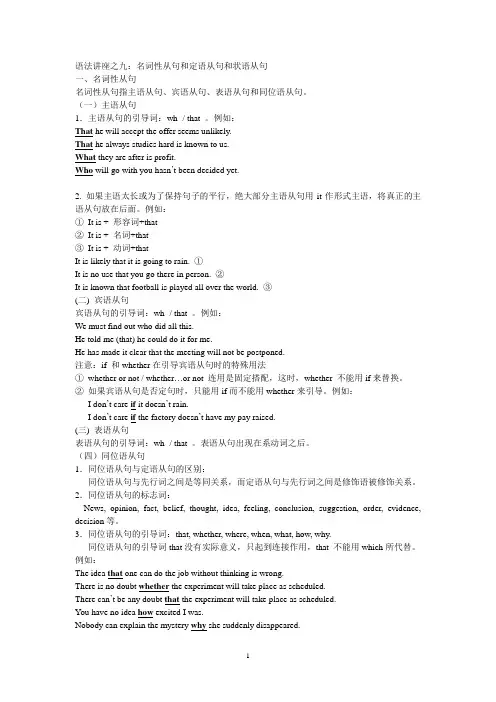
语法讲座之九:名词性从句和定语从句和状语从句一、名词性从句名词性从句指主语从句、宾语从句、表语从句和同位语从句。
(一)主语从句1.主语从句的引导词:wh- / that 。
例如:That he will accept the offer seems unlikely.That he always studies hard is known to us.What they are after is profit.Who will go with you hasn’t been decided yet.2. 如果主语太长或为了保持句子的平行,绝大部分主语从句用it作形式主语,将真正的主语从句放在后面。
例如:①It is + 形容词+that②It is + 名词+that③It is + 动词+thatIt is likely that it is going to rain. ①It is no use that you go there in person. ②It is known that football is played all over the world. ③(二) 宾语从句宾语从句的引导词:wh- / that 。
例如:We must find out who did all this.He told me (that) he could do it for me.He has made it clear that the meeting will not be postponed.注意:if 和whether在引导宾语从句时的特殊用法①whether or not / whether…or not 连用是固定搭配,这时,whether 不能用if来替换。
②如果宾语从句是否定句时,只能用if而不能用whether来引导。
例如:I don’t care if it doesn’t rain.I don’t care if the factory doesn’t have my pay raised.(三) 表语从句表语从句的引导词:wh- / that 。
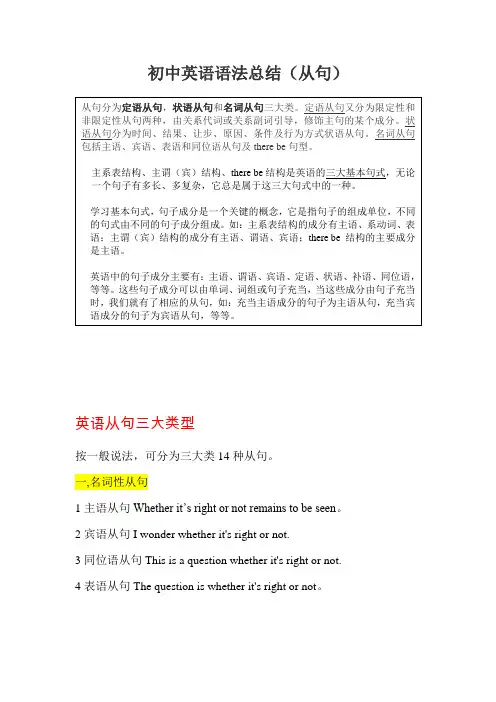
初中英语语法总结(从句)英语从句三大类型按一般说法,可分为三大类14种从句。
一,名词性从句1主语从句Whether it’s right or not remains to be seen。
2宾语从句I wonder whether it's right or not.3同位语从句This is a question whether it's right or not. 4表语从句The question is whether it's right or not。
二,定语从句1限定性定语从句She is the student who can speak English well。
2非限定性定语从句She is the student, who can speak English well。
三,状语从句1时间状语从句The fact will come out when he comes here。
2地点状语从句You can go wherever you like。
3原因状语从句Pay more attention to your lessons because you are astudent。
4方式状语从句He walks as if he were a king.5目的状语从句She went to Japan so that she could learn Japanese well. 6结果状语从句She went to Japan so that she learned Japanese well.7条件状语从句I will understand it if he tells me.8让步状语从句He knows a lot though he is little.1.定语从句There are some old books in the box.The boy dressed in blue is from America。
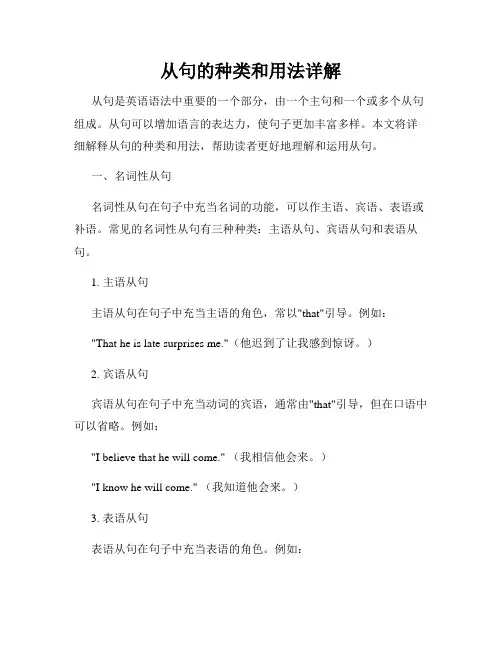
从句的种类和用法详解从句是英语语法中重要的一个部分,由一个主句和一个或多个从句组成。
从句可以增加语言的表达力,使句子更加丰富多样。
本文将详细解释从句的种类和用法,帮助读者更好地理解和运用从句。
一、名词性从句名词性从句在句子中充当名词的功能,可以作主语、宾语、表语或补语。
常见的名词性从句有三种种类:主语从句、宾语从句和表语从句。
1. 主语从句主语从句在句子中充当主语的角色,常以"that"引导。
例如:"That he is late surprises me."(他迟到了让我感到惊讶。
)2. 宾语从句宾语从句在句子中充当动词的宾语,通常由"that"引导,但在口语中可以省略。
例如:"I believe that he will come." (我相信他会来。
)"I know he will come." (我知道他会来。
)3. 表语从句表语从句在句子中充当表语的角色。
例如:"The important thing is that you try your best."(最重要的是你尽力而为。
)二、定语从句定语从句用来修饰名词或代词,常以关系代词或关系副词引导。
定语从句通常紧跟在被修饰的名词或代词之后。
例如:"The man who is speaking is my teacher."(正在说话的那个人是我的老师。
)"The book that I borrowed from the library is interesting."(我从图书馆借的那本书很有趣。
)三、状语从句状语从句用来表达时间、条件、原因、结果、目的、比较等信息,在句子中充当状语的角色。
根据不同的用途,状语从句可以分为六种类型。
1. 时间状语从句时间状语从句用来表示一个动作或事件发生的时间。
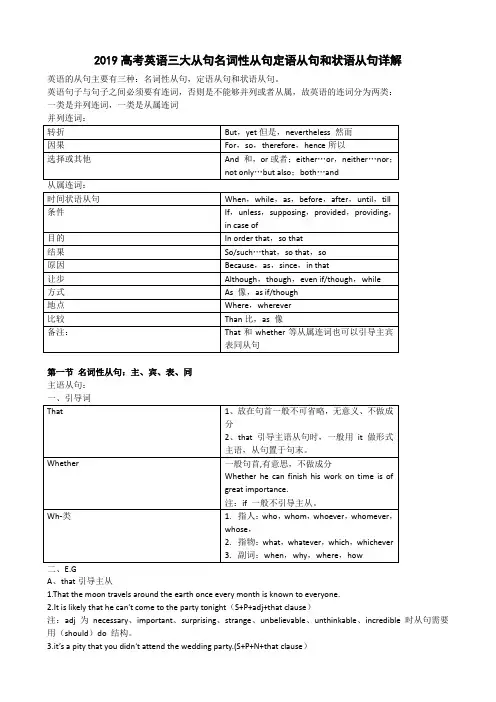
2019高考英语三大从句名词性从句定语从句和状语从句详解英语的从句主要有三种:名词性从句,定语从句和状语从句。
英语句子与句子之间必须要有连词,否则是不能够并列或者从属,故英语的连词分为两类:一类是并列连词,一类是从属连词并列连词:第一节名词性从句:主、宾、表、同主语从句:A、that引导主从1.That the moon travels around the earth once every month is known to everyone.2.It is likely that he can't come to the party tonight(S+P+adj+that clause)注:adj 为necessary、important、surprising、strange、unbelievable、unthinkable、incredible 时从句需要用(should)do 结构。
3.it’s a pity that you didn't attend the wedding party.(S+P+N+that clause)4.it is said that he possesses the too much money.(S+P+done that clause)5.it seems to me that you don't like the idea.(it+特殊动词that clause:seem,matter,turn out,happen等)B、指人指物的为连接代词:故在从句中充当:主宾表语成分,部分充当定语成分whose连接副词在从句中充当主要的时间地点原因和方式状语。
宾语从句一、引导词1.That 无意义,不做成分,口语可以省略,if/whether,有意思,不做成分注意,whether…or/or not;和介词后一般不用if 引导2.关系代词(指人,指物)which3.关系副词(时间地点原因方式)4.特殊的宾从:1.大多数及物动词可以带宾从;在一些v+adv结构中也可以如:figure out,work out,find out,point out 等;一些动词短语也可以如make sure that、keep in mind that2.注意:find,feel,think,consider,make,believe,guess,suppose,assume后如果有宾补时,要借助it形式宾语,将that从句后置Appreciate表示hate,like,take,owe,have,take()for granted等和see to留意后如果有宾补时需要借助it 形式宾语,将宾从后置e.g I hate if when that they talk with their mouth full of foodPlease see to it that the door is safely locked before you go注:介词后that 所引导的宾从必须要用it 形式宾语,除“beyond,but,besides,except,save that clause”“除了”和“in that”“因为”。

英语三大从句LELE was finally revised on the morning of December 16, 2020复合句【语法要点】复合句是由一个主句加一个或几个从句所构成的句子。
从句只用作句子的一个成分,不能独立。
根据从句在句子中的作用,可分为名词性从句、定语从句和状语从句三类。
(一)名词性从句名词性从句包括主语从句、表语从句、宾语从句、同位语从句。
其关联词有连接词that、if、whether;疑问代词who、what、which和疑问副词when、where、how、why等。
1)if不能引导表语从句。
连接代词who、what、whose、which不能引导同位语从句。
2)有时as、as if/though、because也可以引导表语从句,能跟表语从句的谓语动词一般为系动词be、seem、look等。
例如:Things are not always as they seem to be.事情并不总是像表面上看来的那样。
It looks as if it were going to rain. It is because you eat too much.3)介词宾语不可以用which来引导,而要用what来引导。
例如:We can learn what we did not know. He will talk to us about what he saw in the .4)连词that引导的名词性从句除能用在except、but、in后之外很少作介词的宾语,。
其它一些介词的宾语从句如果由连词that引导,则需用it先行一步作形式宾语。
例如:He is a good student except that he is careless.You may depend on it that they will support you.5)若主句谓语动词是及物动词make、find、think、see、hear等,则把宾语从句置于宾语补足语之后,用it作形式宾语。
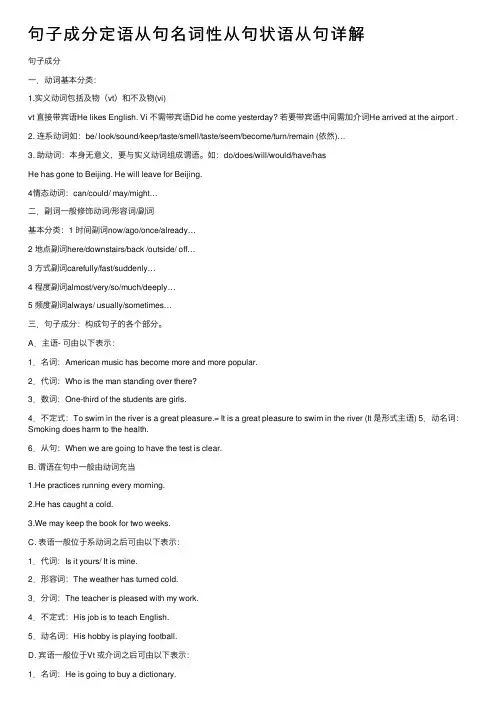
句⼦成分定语从句名词性从句状语从句详解句⼦成分⼀.动词基本分类:1.实义动词包括及物(vt)和不及物(vi)vt 直接带宾语He likes English. Vi 不需带宾语Did he come yesterday? 若要带宾语中间需加介词He arrived at the airport .2. 连系动词如:be/ look/sound/keep/taste/smell/taste/seem/become/turn/remain (依然)…3. 助动词:本⾝⽆意义,要与实义动词组成谓语。
如:do/does/will/would/have/hasHe has gone to Beijing. He will leave for Beijing.4情态动词:can/could/ may/might…⼆.副词⼀般修饰动词/形容词/副词基本分类:1 时间副词now/ago/once/already…2 地点副词here/downstairs/back /outside/ off…3 ⽅式副词carefully/fast/suddenly…4 程度副词almost/very/so/much/deeply…5 频度副词always/ usually/sometimes…三.句⼦成分:构成句⼦的各个部分。
A.主语- 可由以下表⽰:1.名词:American music has become more and more popular.2.代词:Who is the man standing over there?3.数词:One-third of the students are girls.4.不定式:To swim in the river is a great pleasure.= It is a great pleasure to swim in the river (It 是形式主语) 5.动名词:Smoking does harm to the health.6.从句:When we are going to have the test is clear.B. 谓语在句中⼀般由动词充当1.He practices running every morning.2.He has caught a cold.3.We may keep the book for two weeks.C. 表语⼀般位于系动词之后可由以下表⽰:1.代词:Is it yours/ It is mine.2.形容词:The weather has turned cold.3.分词:The teacher is pleased with my work.4.不定式:His job is to teach English.5.动名词:His hobby is playing football.D. 宾语⼀般位于Vt 或介词之后可由以下表⽰:1.名词:He is going to buy a dictionary.2.代词:We should learn from him.3.不定式:He decided not to see me.4.动名词:He practices running every morning.分类:分为直接宾语(动作的承受者,通常指物)和间接宾语(动作所向的⼈或物,通常指⼈)He sent me a present.=He sent a present to me. (me 间宾/ a present 直宾)He bought her a map= He bought a map for her.有些Vt 如:make/have/get/let/find/call/see/notice/hear/watch除了跟有⼀个宾语外,还要有⼀个宾语补⾜语来说明宾语的状态才能使句⼦完整。
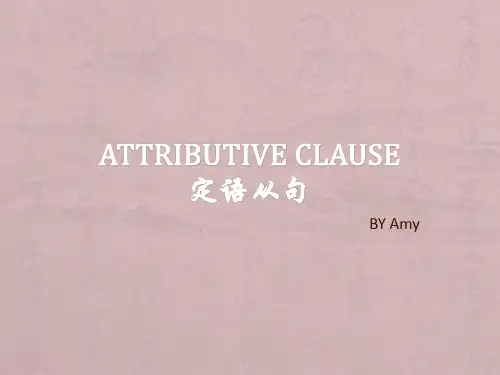
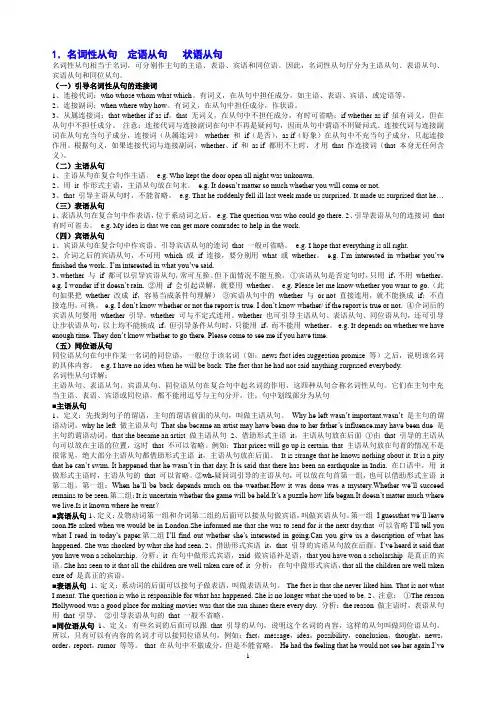
1.名词性从句定语从句状语从句名词性从句相当于名词,可分别作主句的主语、表语、宾语和同位语。
因此,名词性从句厅分为主语从句、表语从句、宾语从句和同位从句。
(一)引导名词性从句的连接词1、连接代词:who whose whom what which。
有词义,在从句中担任成分,如主语、表语、宾语、或定语等。
2、连接副词:when where why how。
有词义,在从句中担任成分,作状语。
3、从属连接词:that whether if as if。
that 无词义,在从句中不担任成分,有时可省略;if whether as if 虽有词义,但在从句中不担任成分。
注意:连接代词与连接副词在句中不再是疑问句,因而从句中谓语不用疑问式。
连接代词与连接副词在从句充当句子成分,连接词(从属连词)whether 和if(是否),as if(好象)在从句中不充当句子成分,只起连接作用。
根据句义,如果连接代词与连接副词,whether、if 和as if 都用不上时,才用that 作连接词(that 本身无任何含义)。
(二)主语从句1、主语从句在复合句作主语。
e.g. Who kept the door open all night was unkonwn.2、用it 作形式主语,主语从句放在句末。
e.g. It doesn‟t matter so much whether you will come or not.3、that 引导主语从句时,不能省略。
e.g. That he suddenly fell ill last week made us surprised. It made us surprised that he…(三)表语从句1、表语从句在复合句中作表语,位于系动词之后。
e.g. The question was who could go there.2、引导表语从句的连接词that 有时可省去。
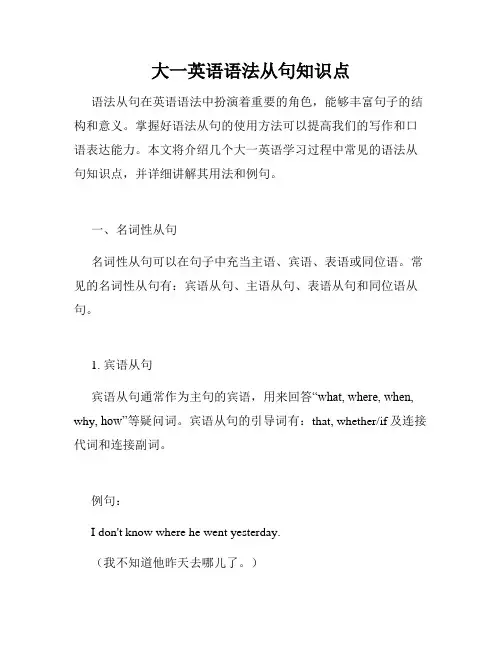
大一英语语法从句知识点语法从句在英语语法中扮演着重要的角色,能够丰富句子的结构和意义。
掌握好语法从句的使用方法可以提高我们的写作和口语表达能力。
本文将介绍几个大一英语学习过程中常见的语法从句知识点,并详细讲解其用法和例句。
一、名词性从句名词性从句可以在句子中充当主语、宾语、表语或同位语。
常见的名词性从句有:宾语从句、主语从句、表语从句和同位语从句。
1. 宾语从句宾语从句通常作为主句的宾语,用来回答“what, where, when, why, how”等疑问词。
宾语从句的引导词有:that, whether/if及连接代词和连接副词。
例句:I don't know where he went yesterday.(我不知道他昨天去哪儿了。
)He asked me if I could help him with the project.(他问我是否能帮他完成这个项目。
)2. 主语从句主语从句位于句子主语的位置,引导词常常是“what, who, which, whether”等。
例句:What he said is true.(他所说的是真的。
)Whether we can go camping depends on the weather.(我们是否能去野营取决于天气。
)3. 表语从句表语从句用来解释或说明主语的身份、特征、状态等。
常用的引导词有:that, whether, who, which等。
例句:The important thing is that you are safe.(重要的是你平安。
)The question is whether he will come to the party.(问题是他是否会来参加聚会。
)4. 同位语从句同位语从句用来对某个名词或代词进行解释或说明。
常用引导词为:that, who, what等。
例句:The news that he passed the exam made us happy.(他通过了考试的消息让我们很高兴。
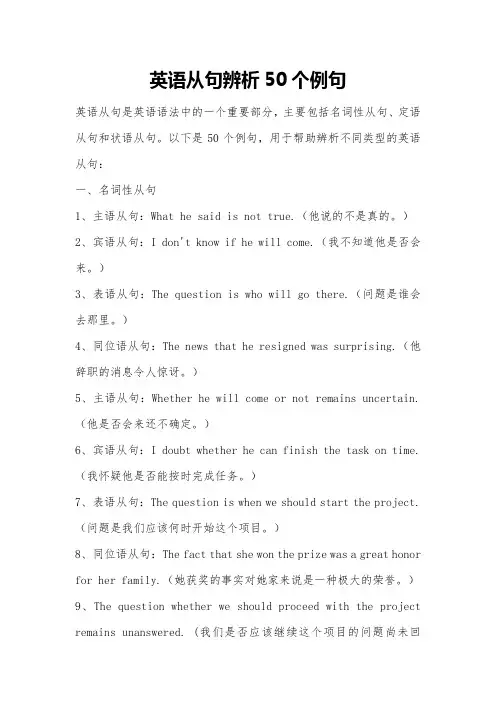
英语从句辨析50个例句英语从句是英语语法中的一个重要部分,主要包括名词性从句、定语从句和状语从句。
以下是50个例句,用于帮助辨析不同类型的英语从句:一、名词性从句1、主语从句:What he said is not true.(他说的不是真的。
)2、宾语从句:I don't know if he will come.(我不知道他是否会来。
)3、表语从句:The question is who will go there.(问题是谁会去那里。
)4、同位语从句:The news that he resigned was surprising.(他辞职的消息令人惊讶。
)5、主语从句:Whether he will come or not remains uncertain.(他是否会来还不确定。
)6、宾语从句:I doubt whether he can finish the task on time.(我怀疑他是否能按时完成任务。
)7、表语从句:The question is when we should start the project.(问题是我们应该何时开始这个项目。
)8、同位语从句:The fact that she won the prize was a great honor for her family.(她获奖的事实对她家来说是一种极大的荣誉。
)9、The question whether we should proceed with the project remains unanswered. (我们是否应该继续这个项目的问题尚未回答。
)10、It's a fact that the company is going through a tough period. (公司正在经历困难时期,这是事实。
)11、The reason why he resigned was not made public. (他辞职的原因没有公开。
初中四大从句初中四大从句是指名词性从句、定语从句、状语从句和主语从句。
这四种从句在英语学习中非常重要,掌握它们的用法可以帮助我们更好地理解和运用英语语法。
下面,我将分别介绍这四种从句的用法和例句。
一、名词性从句名词性从句是指在句子中充当名词的从句,可以作主语、宾语、表语或同位语。
名词性从句通常由连词that, whether, if, who, whom, whose, what, which等引导。
1. 主语从句That he is a liar is beyond doubt.(他是个骗子是毫无疑问的。
)Whether he will come or not is still uncertain.(他是否会来还不确定。
)2. 宾语从句I don't know what he is doing now.(我不知道他现在在干什么。
) She asked me if I had finished my homework.(她问我是否完成了作业。
)3. 表语从句The problem is whether we should go or stay.(问题是我们是该走还是留。
)The fact is that he is always late.(事实是他总是迟到。
)4. 同位语从句The news that he won the prize surprised us all.(他获奖的消息让我们都很惊讶。
)The idea that we should work hard is very important.(我们应该努力工作的想法非常重要。
)二、定语从句定语从句是指修饰名词或代词的从句,通常由关系代词who, whom, whose, that, which等引导。
1. 修饰人的定语从句The girl who is singing is my sister.(唱歌的女孩是我妹妹。
)The teacher whom we met yesterday is very kind.(昨天我们遇到的老师非常友好。
三大从句知识点总结一、名词性从句名词性从句是在句子中充当名词的作用,可以位于主句中的主语、宾语、表语或者介词宾语的位置,起着名词的作用,因此也被称为从句名词。
名词性从句主要包括宾语从句、主语从句、表语从句和同位语从句等几种。
1. 宾语从句宾语从句用来充当主句中的及物动词(transitive verb)或介词后面的宾语,例如:I know (that) he is coming.(我知道他要来了。
)He said (that) he would come tomorrow.(他说他明天会来。
)在上面的两个例句中,that引导的从句分别充当了know和said后面的宾语。
2. 主语从句主语从句用来作为整个主句的主语,例如:That he is so successful surprises everyone.(他这么成功让每个人都感到惊讶。
)What he is saying is true.(他所说的是真的。
)在上面的两个例句中,从句that he is so successful和what he is saying分别作为整个主句的主语。
3. 表语从句表语从句用来作为及物动词后的表语,例如:The problem is that we don't have enough time.(问题就在于我们没有足够的时间。
)在这个例句中,从句that we don't have enough time充当了动词is后的表语。
4. 同位语从句同位语从句用来解释或者说明名词的内容,例如:The news that he won the prize is exciting.(他获奖的消息令人兴奋。
)在这个例句中,从句that he won the prize充当了news这个名词的同位语。
名词性从句在句子中起着非常重要的作用,能够充分地承担名词的功能,并且丰富了句子的表达方式。
二、定语从句定语从句用来修饰名词或代词,对其进行进一步的说明或者限定,增加句子的信息量。
高一常见知识点梳理从句与状语从句高一常见知识点梳理:从句与状语从句从句和状语从句是高中英语中常见而重要的语法知识点。
掌握了从句和状语从句的用法和特点,可以帮助我们更准确地表达自己的意思,丰富句子结构,提高语言表达能力。
本文将对高一常见的从句和状语从句进行梳理和归纳。
一、从句的基本概念从句是一个句子的组成部分,不能独立存在,依附于主句,起到某种句子成分的作用。
从句分为名词性从句、定语从句和状语从句三种类型。
1. 名词性从句名词性从句在句中充当名词的成分,可以作主语、宾语、表语和同位语。
例如:- 主语从句: What he said is true. (他说的是真的。
)- 宾语从句: I know that he is coming. (我知道他要来。
)- 表语从句: The truth is that I am tired. (事实是我很累。
)- 同位语从句: His hope is that he can pass the exam. (他的希望是能通过考试。
)2. 定语从句定语从句用来修饰名词或代词,相当于一个形容词。
关系代词引导定语从句。
例如:- The book that I borrowed from the library is very interesting. (我从图书馆借来的那本书非常有趣。
)3. 状语从句状语从句用来表示时间、原因、条件、方式、结果等,相当于一个副词。
常用的连接词有when、because、if、how、so等。
例如:- When you finish your homework, you can go out to play. (当你完成作业时,你可以出去玩。
)- He failed the exam because he didn't study hard. (他考试不及格是因为他没有努力学习。
)- If it rains tomorrow, we will stay indoors. (如果明天下雨,我们就呆在室内。
PART1:英语从句三大类型按一般说法,可分为三大类14种从句。
一,名词性从句1主语从句Whether it's right or not remains to be seen.2宾语从句I wonder whether it's right or not.3同位语从句This is a question whether it's right or not.4表语从句The question is whether it's right or not.二,定语从句1限定性定语从句She is the student who can speak English well.2非限定性定语从句She is the student,who can speak English well.三,状语从句1时间状语从句The fact will come out when he comes here.2地点状语从句You can go wherever you like.3原因状语从句Pay more attention to your lessons because you are a student.4方式状语从句He walks as if he were a king.5目的状语从句She went to Japan so that she could learn Japanese well.6结果状语从句She went to Japan so that she learned Japanese well.7条件状语从句I will understand it if he tells me.8让步状语从句He knows a lot though he is little.PART2:经典名词性从句主语从句(subject clauses)在复合句中起主语作用的从句叫主语从句。
英语八大从句类型与用法总结从句是句子中的一种结构,可以用来增强句子的表达能力。
英语中常见的八大从句类型包括:1. 名词性从句 (Noun Clauses)名词性从句用来作为名词的替代,可以作为主语、宾语、表语或同位语等。
常见的名词性从句有:主语从句(作主语),宾语从句(作宾语),表语从句(作表语),同位语从句(作同位语)。
2. 定语从句 (Adjective Clauses)定语从句用来对一些名词或代词进行修饰和限定,一般紧跟在被修饰的名词或代词之后。
常见的引导词有:that, which, who, whom, whose 等。
3. 状语从句 (Adverbial Clauses)状语从句用来修饰动词、形容词、副词等,表示时间、地点、原因、条件、结果等。
常见的引导词有:when, while, before, after, since, because, if, unless, so that等。
4. 并列从句 (Coordination Clauses)并列从句是由连词and, but, or等连接在一起的两个或多个独立的主句。
并列从句可以使用逗号或分号分隔。
5. 让步从句 (Concessive Clauses)让步从句用来表示与主句相对抗的情况,常用的引导词有:although, though, even though, while等。
6. 条件从句 (Conditional Clauses)条件从句用来表示其中一种条件,通过条件从句的实现与结果从句的实现之间的关系。
常见的引导词有:if, unless, as long as, provided that等。
7. 结果从句 (Result Clauses)结果从句用来表示主句发生的结果,常见的引导词有:so that, such that, so...that等。
8. 目的从句 (Purpose Clauses)目的从句用来表示主句的目的或意图,常见的引导词有:so that, in order that等。
名词性从句、定语从句和状语从句1.Did you tell him _____?A. where your address wasB. where was your addressC. what your address wasD. what was your address2.Allen was advised to give the work to ____ he believed had a strong sense of responsibility.A. whomB. whoeverC. whomeverD. those3.Is this hotel _____ you said we were to stay in your letter?A. thatB. whereC. the oneD. in which4.---Do you always have weather like this in May?---Generally it’s much cooler than this. And I can’t rememb er_____ we had such a rainy day.A. whenB. whereC. whetherD. though5.--- Why didn’t he come to school yesterday?---The reason_____ he told us was _____ he had been caught in an accident.A. why; thatB. that; thatC. that; becauseD. why; because6.The man ____ talked about is a medical winner.A. whom wasB. whoC. thatD. we7.He is a teacher, _____ became clear from his manner.A. whoB. whomC. asD. that8.I must make full use of time _____ left to me and do as much as I can for the people.A. whichB. there isC. thatD. when9.You can use a plastic bottle, _____ cut off, as a pot to grow your plants in.A. the top isB. with its topC. whose topD. which top10.I had coffee after dinner in my study, _____ is my usual practice.A. thatB. whenC. asD. where11.--- Have you seen such an interesting film as “ The Return of the King--- Lord of the Rings”?---Oh, yes, but it was ____ I was at college.A. thatB. sinceC. whenD. /12.The fans, I couldn’t imagine that moment, _____ were so crazy, demanded kisses from the popstar.A. whyB. whoC. /D. when13.It was in Beihai Park_____ they made a date for the first time _____ the old couple told us theirlove story.A. where; thatB. that; thatC. where; whenD. that; when14.Keep away from such things _____ will do you harm.A. asB. thatC. likeD. which15.Recently he’s made anther wonderful invention, _____ of great importance to science.A. that I suppose it isB. which I suppose isC. I suppose which it isD. and I suppose which it is16._____ Mary _____ Sue knows nothing about the matter, _____ they didn’t come to the school lastFriday.A. Either; or; becauseB. Both; and; asC. Neither; nor; sinceD. Not only; but also; for17.These two areas are similar _____ they both have a rainfall during this season?A. so much asB. in caseC. so long asD. in that18.Living and working in the relay station(转播台)has some problems you can’t imagine, _____getting water is not the least.A. from whichB. in whichC. of whichD. by whichst night I came across the man _____ you think is pleasant to _____.A. who; get alongB. who; talkC. who; work withD. whom; get along with20.Is there anything you’ve let go off _____ perhaps you’d like to pick up again?A. whichB. thatC. whatD. it21.By the year 2015, the world population will be _____ today.A. as twice as what it isB. twice what it isC. twice as it isD. twice of what is22._____ there are a large number of chemical factories, the air is likely to be polluted.A. ThatB. WhereC. OnceD. As23.How can they learn anything_____ they spend all their spare time watching television?A. whenB. beforeC. afterD. even24.The postman comes at 6:30 in the morning _____I am usually fast asleep.A. which timeB. at what timeC. at which timeD. what time25._____ she has had, she never loses her good humour.A. However tired a dayB. However tiring a dayC. Whatever tiring a dayD. Whatever tiring a day26.Rod is determined to get a seat for the concert_____ it means standing in a queue all night.A. as long asB. whateverC. even ifD. as ifte at night I just throw out ideas--- I let my mind wander_____ it will.A. whereB. whenC. thatD. how28.It was the Civil War, however, _____ made card photographs an American practice.A. whenB. thatC. whichD. why29.The food is comforting, _____ the season is.A. wheneverB. howeverC. whereverD. whatever30.--- I have never spoken ill of Mary.--- _____ you don’t like her.A. IfB. BecauseC. So thatD. Though31.Scientists say it may be a long time_____ this kind of medicine can be tested on human patients.A. sinceB. thatC. afterD. before32._____ China’s reform(改革)and opening up in late 1978, its quick development has arousedworldwide attention.A. WhenB. AsC. WhileD. Since33.It was in the room_____ he had studied for three years_____ he found his lost pen.A. where; thatB. that; thatC. that; whenD. where; when34._____ we first heard of the man referred to as a computer specialist(专家)in software.A. It was Hilary thatB. That it was from HilaryC. It was from Hilary whomD. It was from Hilary that35._____ I read this book, I never realized what a hard life he had at an early age.A. WhenB. SinceC. WhileD. Until36.---_____ three more days enough for the work to be finished?--- I don’t think it’s enough and only after_____ go on with it.A. Is; does the rain stop we canB. Is; the rain stops can weC. Are; the rain stops we canD. Are; the rain stops can we37.So many uses have been discovered for this wood_____ the supply of white pine is becomingsmaller and smaller.A .then B. what C. that D. which38.Doing your homework is a sure way to improve your test scores, and this is especially true____ itcomes to classroom tests.A. beforeB. sinceC. whenD. after39.The English play_____ my students acted at the New Year’s party was a great success.A. for whichB. at whichC. in whichD. on which40.You are saying that everyone should be equal, and this is_____ I disagree.A. whyB. whereC. whatD. how41.There were dirty marks on her trousers_____ she had wiped her hands.A. whereB. whichC. whenD. that42._____ you call me to say you’re not coming, I’ll see you at the theatre.A. ThoughB. WhetherC. UntilD. Unless43.To enjoy the scenery, Irene would rather spend long hours on the train_____ travel by air.A. asB. toC. thanD. while44.I hope you don’t mind me asking, _____ where did you buy those shoes?A. soB. andC. yetD. but45.I do every single bit of housework_____ my husband Bob just does the dishes now and then.A. sinceB. whileC. whenD. as46.There are altogether eleven books on the shelf, _____ five are mine.A. on whichB. in whichC. of whichD. from which47.Several weeks had gone by_____ I realized the painting was missing.A. asB. beforeC. sinceD. whenThe Foreign Minister said, “_____ our hope that the two sides will work towards peace.”A. This isB. There isC. That isD. It is48.We can’t figure out_____ qui te a number of insects, birds, and animals are dying out.A. thatB. asC. whyD. when49._____ is reported in the newspapers, talks between the two countries are making progress.A. ItB. AsC. ThatD. What50.American women usually identify their best friend as someone_____ they can talk frequently.A. whoB. asC. about whichD. with whom51.After Yang liwei succeeded in circling the earth, _____ our astronauts desire to do is walk inspace. A. where B. what C. that D. how 52.Jasmine was holidaying with her family in a wildlife park_____ she was bitten on the leg by alion. A. when B. while C. since D. once53.A story goes_____ Elizabeth I of English liked nothing more than being surrounded by clever andqualified noblemen at court.A. whenB. whereC. whatD. that54.We were told that we should follow the main road_____ we reached the central railway station.A. wheneverB. untilC. whileD. wherever55.The factory produces half a million pairs of shoes every year, 80%_____ are sold abroad.A. of whichB. which ofC. of themD. of that56.Helen was much kinder to her youngest son than to the others, _____, of course, made the othersenvy him. A. who B. that C. what D. which57.It was evening_____ we reached the little town of Winchester.A. thatB. untilC. sinceD. before58.A. modern city has been set up in_____ was a wasteland ten years ago.A. whatB. whichC. thatD. where59._____ I accept that he is not perfect, I do actually like the person.A. WhileB. SinceC. BeforeD. Unless60._____ is often the case, we have worked out the production plan.A. WhichB. WhenC. WhatD. As61.Anyway, that evening, _____ I’ll tell you more about later, I ended up staying at Rachel’s place.A. whenB. whereC. whatD. which62.There was_____ time_____ I hated to go to school.A. a; thatB. a; whenC. the; thatD. the; when63.You should try to get a good night’s sleep_____ much work you have to do.A. howeverB. no matterC. althoughD. whatever64.I work in a business_____ almost everyone is waiting for a great chance.A. howB. whichC. whereD. that65.I think Father would like to know_____ I’ve been up to so far, so I decide to send him a quicknote. A. which B. why C. what D. how66.I have always been honest and straightforward, and it doesn’t matter_____ I’m talking to.A. who is itB. who it isC. it is whoD. it is whom67.It is_____ any wonder that his friend doesn’t like watching television much.A. noB. suchC. nearlyD. hardly68.Parents are taught to understand_____ important education is to their children’s future.A. thatB. howC. suchD. so69.You can eat food free in my restaurant_____ you like.A. wheneverB. whereverC. whateverD. however70.Parent s should take seriously their children’s requests for sunglasses_____ eye protection isnecessary in sunny weather.A. becauseB. thoughC. unlessD. if。